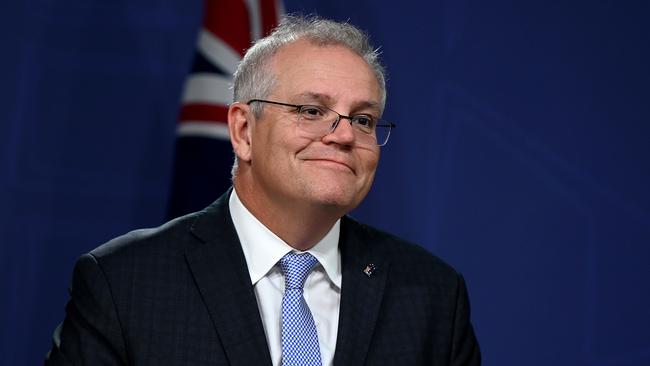James Campbell: Federal election could be on the cards in 2021
Based on some of the federal budget goodies announced so far, it is difficult not to suspect a federal election might be in the cards this year, James Campbell writes.
Opinion
Don't miss out on the headlines from Opinion. Followed categories will be added to My News.
Looking at the goodies already announced ahead of Tuesday’s federal budget, it is hard not to suspect it is meant to be the curtain-raiser to an election.
Last week was the announcement that second and third children will ride free — or nearly free — at childcare.
On Saturday, it was the news the government wants to get single parents —– read, mums — into their own homes with only 2 per cent of the deposit saved.
Along the way we have also learned the government is going to roll over the low and middle income tax offset to avoid 10 million workers paying more in income tax while those of us working will also get an increase in the amount our bosses have to put into our super accounts.
But wait! There’s more! We’ll also see billions in new spending on aged care, mental health and disability services.
The overarching theme will, however, be creating more jobs according to the hints Treasurer Josh Frydenberg is dropping, with the plan to drive down unemployment to levels last seen between 2006 to 2008.
If you were planning to bolt to an election later this year, this would be the sort of budget you would bring down in May.

But in the usual Canberra way, of course, in the past three months the conventional wisdom that we might be off the polls this year has been replaced with a new conventional wisdom that recent sex scandals along with the slow vaccine rollout completely rules this out.
And that was before West Australian voters showed the Liberal Party the door at their state election.
There’s probably very little Scott Morrison can do to fix his problems with voters infuriated by his handling of the Higgins and Porter allegations. But he can probably console himself with the thought that the WA result was down to local factors that will not be in play when he next faces the voters.
And on the vaccine front there’s a good chance things could soon start to look up for the government.
According to a recent report from a respected US healthcare think-tank, supply for vaccines in America could begin to outstrip demand as early as this month.
If this turns out to be right then we will soon be seeing a lot of this excess supply winging its way Down Under.
From an election point of view the government probably doesn’t need the vaccine rollout even close to complete by the time we vote.

All it needs is for everyone who desperately wants one to be able to get one — and by the end of the year the chances are we’ll have enough Pfizer vaccine for that to be the case.
Does this mean an election might still be on the cards this year? You wouldn’t want to rule it out.
And if you were looking for omens from overseas about how that election might go, you could do worse than study this week’s local government polls in the UK.
Of course, comparisons with elections overseas are risky. But if I were the Labor Party in Canberra I’d be looking at the results from England with real fear.
At the polls Boris Johnson’s Conservative Party made spectacular further gains in areas of England that had until recently been the British Labour Party’s heartland.
It was a stunning result for a party in office for more than a decade and on its third prime minister.
The scale of the win surprised observers and showed Johnson’s 2019 election victory, built on gains in those areas, was no fluke.
Johnson made a complete hash of keeping coronavirus out of the UK, though he has made a spectacular success of the vaccine rollout.
But surprisingly, some observers think the pandemic only played a limited part in the result. Instead, they say, the results show that left-of-centre parties like Labour have yet to find a way to beat a right-of-centre party prepared to spend up big.
Listening to Anthony Albanese and his crew talking about the government, it isn’t clear they understand yet what they are up against. Because whatever you say about Scott Morrison and Josh Frydenberg, you can’t call them penny-pinching.
The problem for Labor is that this blatant hip-pocket nerve pitch for its voters comes at the same time as the party is losing votes because of cultural issues.
Like its British counterpart, the ALP is more and more dependent on the votes of the young and tertiary educated with values increasingly at odds with the blue-collar voters who once made up its base.
The UK result shows this problem isn’t just down to local issues but is the result of processes that are underway in other places.





